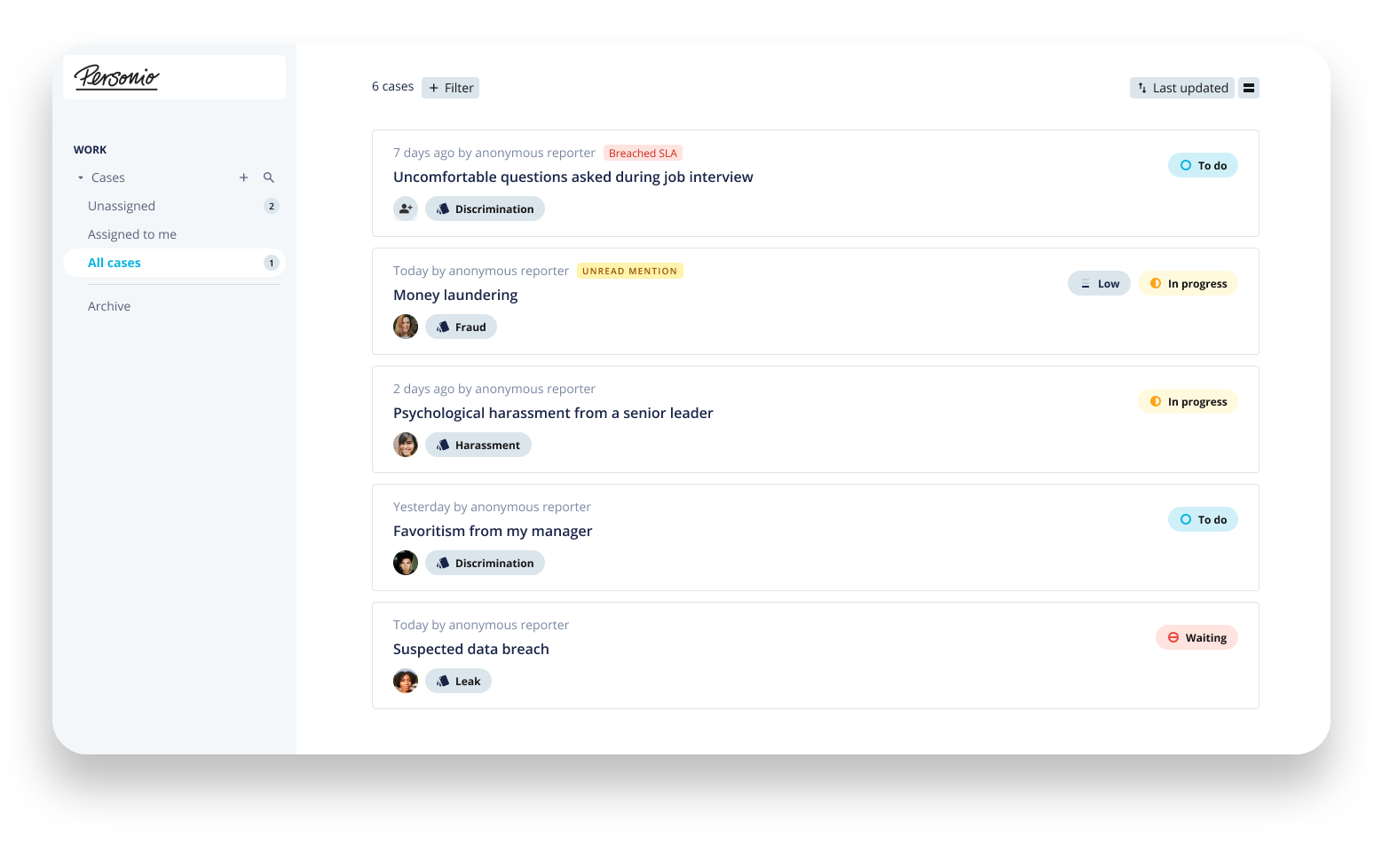Whistleblowing
A dedicated anonymous reporting channel for your employees
The EU Directive on the protection of whistleblowers is now in effect. Companies with over 50 employees must provide an internal reporting channel across the EU's 27 member states. The final enforcement date was already set at 17 December, 2023.
To remain compliant, organisations need a solution that is not only easy to use and 100% secure, but integrates with all of your people operations. Meet Personio Whistleblowing.
![[DEV] Logos Hero Test](https://images.ctfassets.net/p03bi75xct27/19Fy4VpnCWFWY3gFDX0IN5/11fd1bd3e4956014263d0a55df07d1df/Social_Proof_1__1_.png)

Introducing Personio Whistleblowing
As part of our all-in-one HR software solution, Personio Whistleblowing allows employees (and non-employees) to easily, securely and anonymously blow the whistle on wrongdoing. Personio Whistleblowing can help you achieve compliance, avoiding fees, penalties and
potential reputational damage.

More About Personio Whistleblowing



Compliance with EU Whistleblower Directive
Personio Whistleblowing can help you meet local requirements of the EU Whistleblower Directive & GDPR giving you peace of mind that your organization is compliant.

Manage all cases in one place
With our ticketing-like system we want to ensure that you never miss a Whistleblowing report and always know the status of open cases. Easily assign new case to their proper owners to ensure action and transparency.

Safe and anonymous reporting for whistleblowers
Whistleblowers are empowered to speak up and be heard creating a company culture where everyone can feel safe without fear of retaliation. Rely on a secure, password protected anonymous postbox for 2-way communication with the case manager.

Whistleblowing FAQs
What is the EU Whistleblower Protection Directive?
What is the EU Whistleblower Protection Directive?
The EU Directive on the Protection of Whistleblowers was introduced on 16 December, 2019. The goal of the directive was to bring an end to a confusing patchwork of whistleblower protection legislation across the EU through the introduction of a universal European standard. Currently, it has already been passed in many countries, with all EU member states working on their own implementation. The final enforcement date for companies with more than 50 employees is set at 17 December, 2023.
What are the requirements of the EU Whistleblower Protection Directive?
What are the requirements of the EU Whistleblower Protection Directive?
According to the directive, organisations must design and implement internal reporting channels to accommodate effective whistleblowing. In addition, a dedicated person or department should be appointed to handle incoming reports and follow-up accordingly. Such reporting channels should allow reports to be made orally or in writing. The internal reporting channel has to be designed, established and operated in such a manner that it
Provides for anonymous reporting if this is allowed under national legislation
Protects the identity of the reporter and parties mentioned in a report
Is not accessible for non-authorised staff member
Provides for diligent follow-up on the report by a designated person or department
Why do organisations need internal reporting channels?
Why do organisations need internal reporting channels?
An internal reporting channel can be a big boost for your organisation. Apart from the legislative support and mandates, it can also enable organisations to receive and act on complaints of wrongdoing or illegal activities.
Internal reporting channels, like those that allow for whistleblowing, are often seen as a digital safe space for employees and external to voice their concerns anonymously and without fear of retribution. This might include a wide array of topics such as bullying, illegal activities, unethical behaviour, wrongdoings or harassment in the workplace.
What are the benefits of an internal reporting channel?
What are the benefits of an internal reporting channel?
There are three main benefits at play
Companies with a robust whistleblower reporting system had greater profitability and workforce productivity (as measured by Return on Assets)
Fewer material court cases brought against the company overall and with lower settlement costs (if a court case did occur)
Fewer external whistleblower reports to regulatory agencies and other authorities.
When will this be enforced in my country?
When will this be enforced in my country?
The Directive has already been transposed into local law in many of the EU member states. for specific information on your country, please reach out to one of our representatives via the contact form above or refer to our whitepaper.
Are there any fines for organisations who do not comply with these requirements and timelines?
Are there any fines for organisations who do not comply with these requirements and timelines?
The Directive has already been transposed into local law in many EU member states. These fines are wide ranging by country. For specific information on your country, please reach out to one of our representatives via the contact form above or refer to our whitepaper.
Do organisations need to appoint specific people who manage the reported cases?
Do organisations need to appoint specific people who manage the reported cases?
It is advisable to appoint a dedicated person (or more people) within the organisation that is responsible for handling whistleblowing cases. This could be someone in HR, a legal representative or even someone external.
It's that easy
Step 1: Register below
Contact us via the form and request our new Whistleblowing app without obligation.
Step 2: Your Growth Manager will get back to you
As soon as we have received your request, we will give you an introduction to the new app and work out the benefits for your company with you.
Step 3: Let's go
After booking the module, the new functions will be automatically activated in your Personio account.
Learn more about Personio Whistleblowing
Take a look at Personio Whistleblowing yourself! We are happy to guide you through the module and work out potential benefits for your company.
Insights into all functions of the new app
Individual consultation from your Growth Manager
After filling out the form, the Customer Growth Team will get back to you as soon as possible.